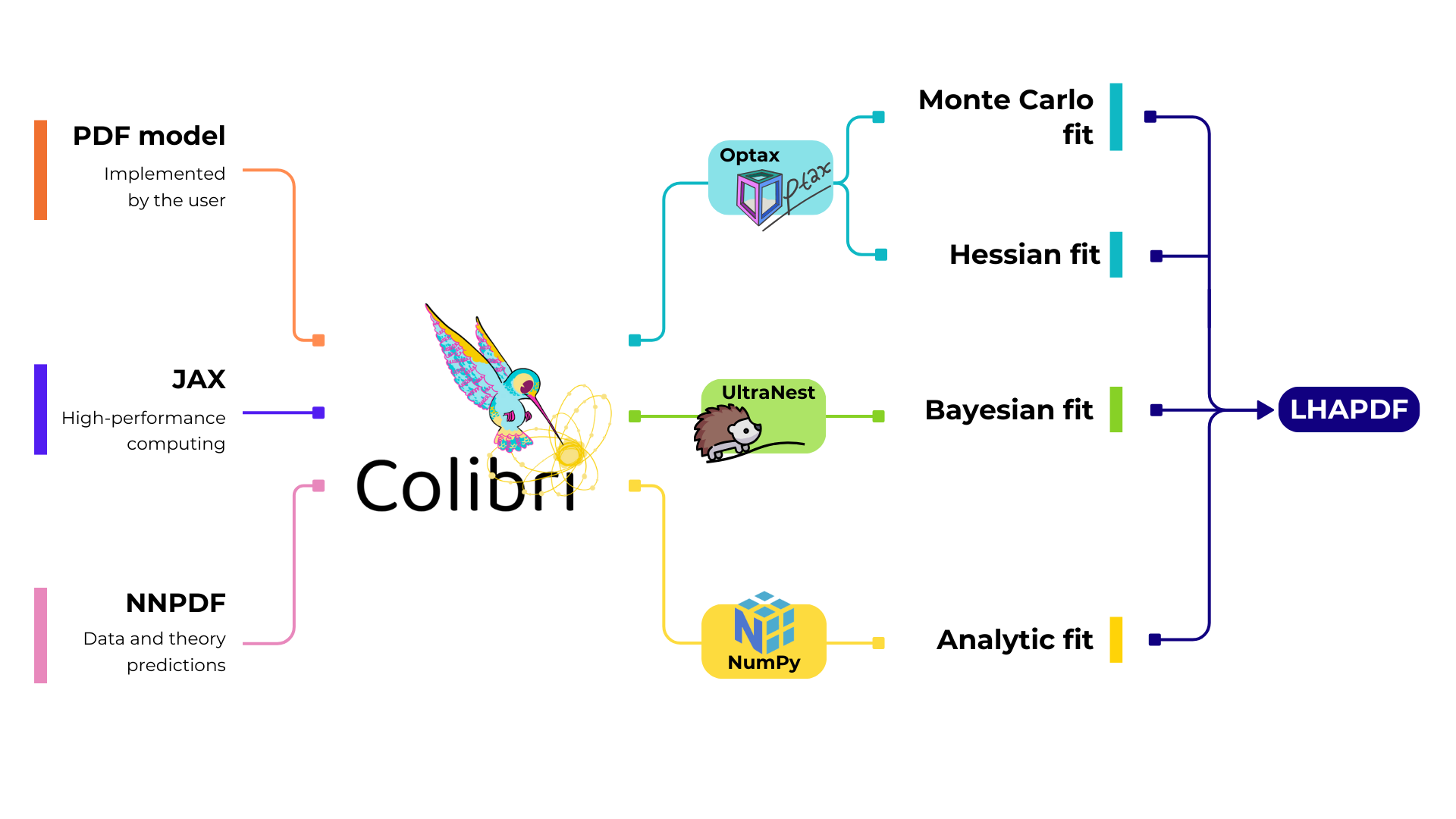Colibri
Colibri is an adaptable, open-source platform for flexible Parton Distribution Function (PDF) fitting. It is a reportengine app that performs PDF fits with any given parametrisation.
The Colibri code
Colibri is available to the public. Along with this online documentation, you can access the code here. The code is made available as an open-source package, together with user-friendly examples and the documentation presented here.
If you are a new user, head along to Getting started and check out the Tutorials.
Colibri’s workflow
The following diagram presents the workflow of the Colibri code.

Colibri takes as input (i) a PDF model, which may be any arbitrary parametrisation implemented by the user, (ii) JAX, which provides high-performance array operations and native GPU support for fast computations, and (iii) data and theory predictions, which it inherits from the NNPDF framework. It then performs a fit using a given inference method, which is specified by the user. At the time of release, the options are a Monte Carlo, Bayesian or analytic fit. In each case, the result follows the LHAPDF format.
The Colibri team
The Colibri collaboration is currently composed of the following members:
Mark N. Costantini - DAMTP, University of Cambridge
Luca Mantani - Universidad de Valencia-CSIC
James M. Moore - DAMTP, University of Cambridge
Valentina Schütze Sánchez - DAMTP, University of Cambridge
Maria Ubiali - DAMTP, University of Cambridge
Contents
Bibliography
S. I. Alekhin and others. DGLAP evolution and parton fits. In HERA and the LHC: A Workshop on the Implications of HERA for LHC Physics: CERN - DESY Workshop 2004/2005 (Midterm Meeting, CERN, 11-13 October 2004; Final Meeting, DESY, 17-21 January 2005), 119–159. Geneva, 2005. CERN. arXiv:hep-ph/0601012.
S. Bailey, T. Cridge, L. A. Harland-Lang, A. D. Martin, and R. S. Thorne. Parton distributions from LHC, HERA, Tevatron and fixed target data: MSHT20 PDFs. Eur. Phys. J. C, 81(4):341, 2021. arXiv:2012.04684, doi:10.1140/epjc/s10052-021-09057-0.
Richard D. Ball and others. An open-source machine learning framework for global analyses of parton distributions. Eur. Phys. J. C, 81(10):958, 2021. arXiv:2109.02671, doi:10.1140/epjc/s10052-021-09747-9.
Andrea Barontini, Mark N. Costantini, Giovanni De Crescenzo, Stefano Forte, and Maria Ubiali. Evaluating the faithfulness of PDF uncertainties in the presence of inconsistent data. JHEP, 3 2025. arXiv:2503.17447.
A. Candido, F. Hekhorn, and G. Magni. N3PDF/eko: Paper (v0.8.5). 2022. Software release. URL: https://doi.org/10.5281/zenodo.6340153, doi:10.5281/zenodo.6340153.
Alessandro Candido, Felix Hekhorn, and Giacomo Magni. EKO: evolution kernel operators. Eur. Phys. J. C, 82(10):976, 2022. arXiv:2202.02338, doi:10.1140/epjc/s10052-022-10878-w.
Mark N. Costantini, Maeve Madigan, Luca Mantani, and James M. Moore. A critical study of the Monte Carlo replica method. JHEP, 12:064, 2024. arXiv:2404.10056, doi:10.1007/JHEP12(2024)064.
Mark N. Costantini, Luca Mantani, James M. Moore, Valentina Schutze Sanchez, and Maria Ubiali. Colibri: A new tool for fast-flying PDF fits. 10 2025. arXiv:2510.03391.
Mark N. Costantini, Luca Mantani, James M. Moore, and Maria Ubiali. A linear PDF model for Bayesian inference. 7 2025. arXiv:2507.16913.
Luigi Del Debbio, Tommaso Giani, and Michael Wilson. Bayesian approach to inverse problems: an application to NNPDF closure testing. Eur. Phys. J. C, 82(4):330, 2022. arXiv:2111.05787, doi:10.1140/epjc/s10052-022-10297-x.
J. Pumplin, D. R. Stump, J. Huston, H. L. Lai, Pavel M. Nadolsky, and W. K. Tung. New generation of parton distributions with uncertainties from global QCD analysis. JHEP, 07:012, 2002. arXiv:hep-ph/0201195, doi:10.1088/1126-6708/2002/07/012.
Zaharid, Mark N. Costantini, wilsonmr, Juan M. Cruz-Martinez, Roy Stegeman, Cameron Voisey, Alessandro Candido, Stefano Carrazza, and Thomas Kluyver. Reportengine: A framework for declarative data analysis. https://doi.org/10.5281/zenodo.14803041, February 2025. doi:10.5281/zenodo.14803041.
Johannes Buchner. A statistical test for Nested Sampling algorithms. Statistics and Computing, 26(1-2):383–392, January 2016. arXiv:1407.5459, doi:10.1007/s11222-014-9512-y.
Johannes Buchner. Collaborative Nested Sampling: Big Data versus Complex Physical Models. \pasp , 131(1004):108005, October 2019. arXiv:1707.04476, doi:10.1088/1538-3873/aae7fc.
Johannes Buchner. UltraNest - a robust, general purpose Bayesian inference engine. The Journal of Open Source Software, 6(60):3001, April 2021. arXiv:2101.09604, doi:10.21105/joss.03001.